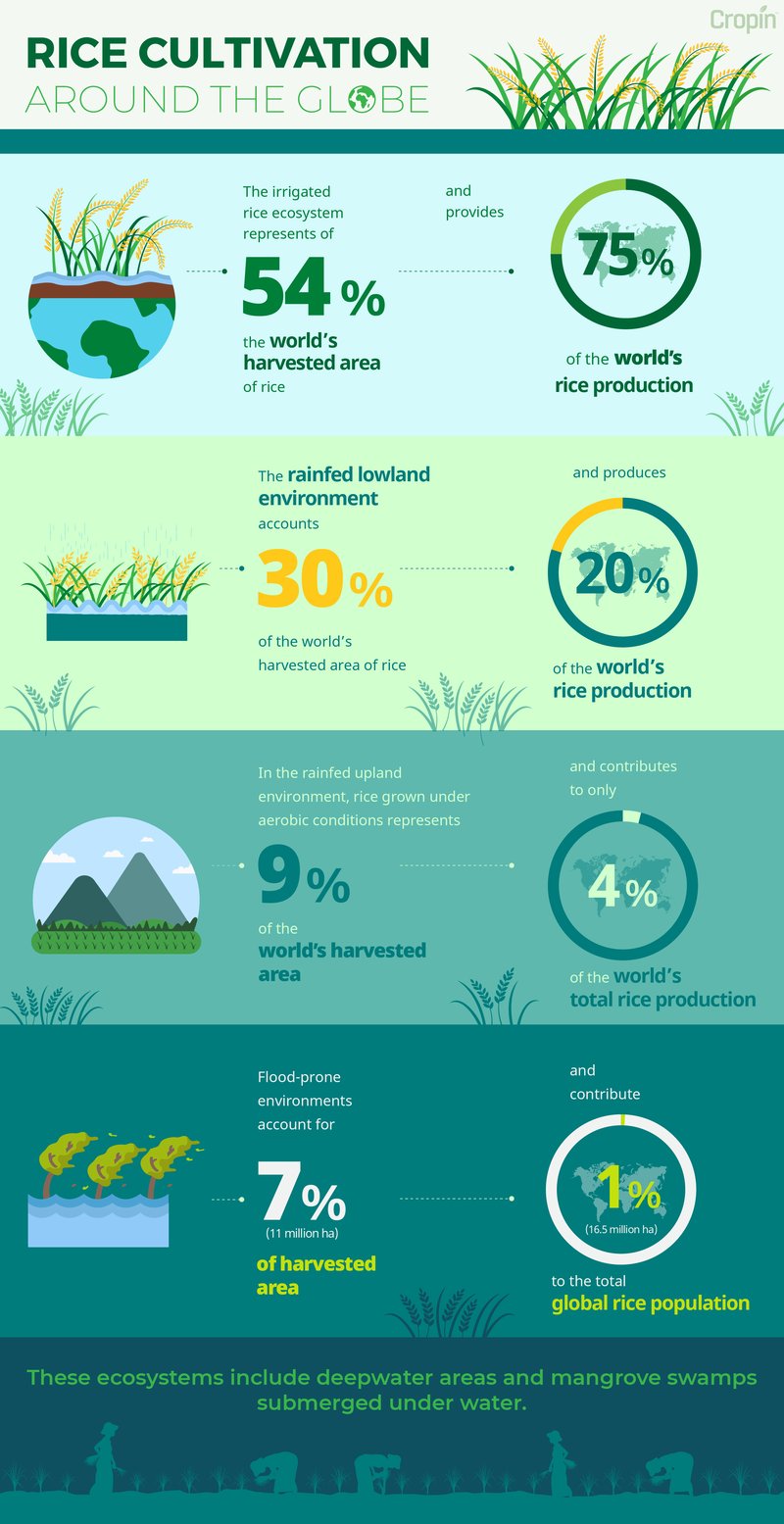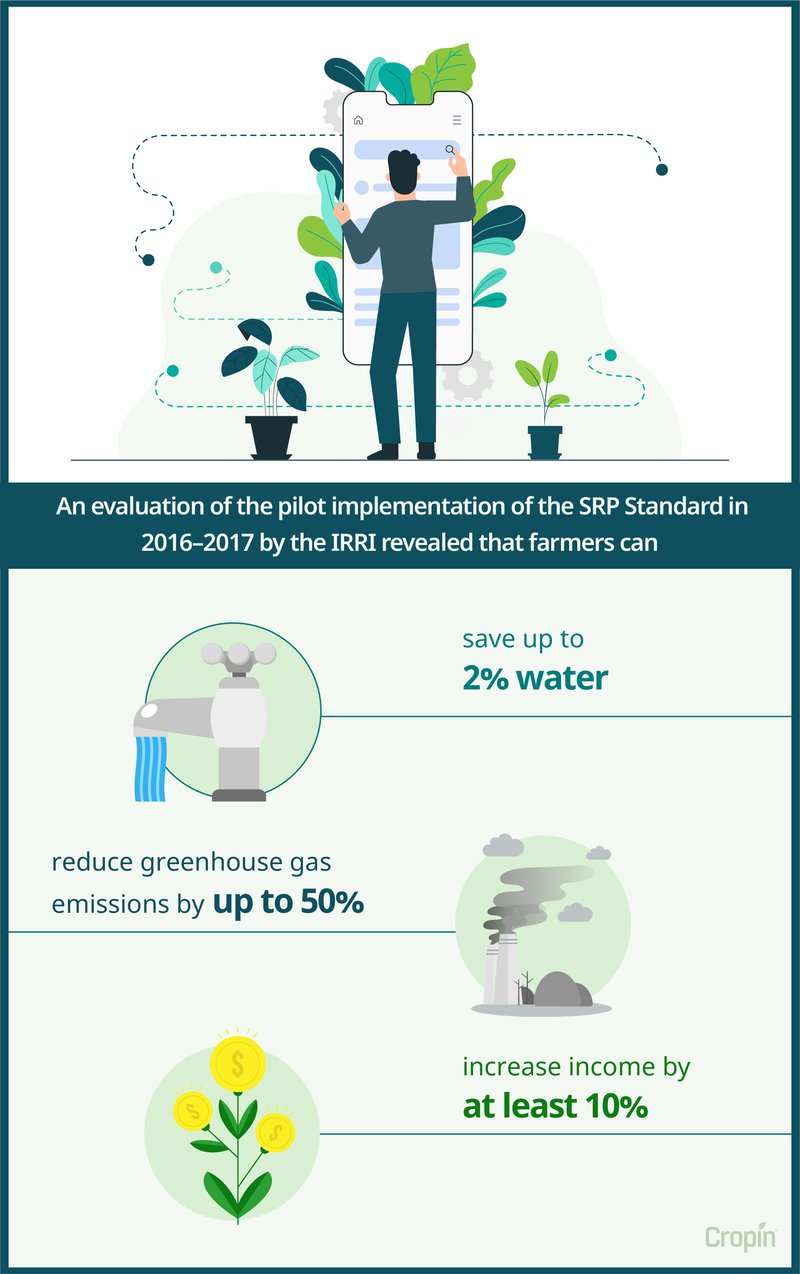Listen here:
As the second-largest staple crop (maize being the first), rice forms an essential component of the diet for more than half of the human population. In 2018, rice paddy amounting to nearly 700 million tonnes was produced, of which 90% (640 million) was from the Asian countries. China and India alone contribute to 50% of the global rice production and consumption year after year. Although tropical marshes are considered its natural habitat, this commercial crop is now widely cultivated in a range of tropical and subtropical regions spread across four distinct ecosystem categories — rainfed lowland, rainfed upland, irrigated, and flood-prone agroecological zones.

Source: KPMG, “Rice Industry Review”
The Challenges In Conventional Rice Cultivation
The traditional cultivation of rice demands an abundant supply of water throughout its crop cycle, so much that it consumes more than a third of the world’s irrigation water. In other words, 2,500 liters of water is required to produce just a single kilo of rice. This lays considerable stress on available water resources, which are already witnessing a steep decline as an effect of population explosion, urbanization, and industrialization.
In addition, rising temperatures and unpredictable rainfall are also adversely affecting the optimal conditions required to produce high-yield, nutritious rice. Rising sea levels and unseasonal floods add to the burden on farmers in South and Southeast Asia, where rice is their primary source of food and its production is fundamental to their income and livelihood.
On the contrary, the production of rice also contributes significantly to global warming as methane gas is produced when organic matter decomposes under anaerobic conditions. The microbes in flooded paddy fields further feed on the decaying organic matter to produce additional methane gas. To such a degree, the widespread cultivation of rice produces close to 12% of the annual emissions globally as a by-product of the process, and methane as a greenhouse gas is at least 25 times more potent than carbon dioxide (CO2). It may well be argued here that rice cultivation causes substantial damage to the environment.
Yet another challenge faced by the global rice supply chain is that although southeast Asia produces anywhere from 9 to 23 million metric tonnes of rice annually, most of this is consumed internally by the producing countries. This food grain constitutes 50% of the caloric supply in the diets of hundreds of millions of Asians. Furthermore, Sub-Saharan Africa’s annual per capita consumption is 27kg/year as rice is the fastest-growing staple crop in the region. Such factors make the sustained production of rice crucial for global food security.
Sustainable Rice – A Pressing Priority
Considering that rice production must increase by 25% over the next 25 years to meet the ever-increasing global demand for the grain, rice farmers the world over need to adopt sustainable best practices. This is also necessary to safeguard Earth’s already limited natural resources and ensure enough for the sustenance of future generations. Furthermore, adopting modern, scientific practices enables farmers to realize enhanced yields in the face of climate change, as compared to following traditional practices that are outdated in many aspects.
To overcome these challenges faced by rice-producing countries in developing regions, UNEP (United Nations Environmental Programme) and IRRI (International Rice Research Institute) co-convened the multi-stakeholder Sustainable Rice Platform (SRP). Set up in 2011, this international collaboration brings together all the key stakeholders in the rice supply chain to evolve and implement effective solutions benefitting rice producers, consumers, and the environment. The SRP has partnered with 100+ public, private and not-for-profit institutions including Cropin, with a vision to help one million smallholder farmers to adopt sustainable best practices for rice production.

In 2015, SRP launched the first-of-its-kind Standard for Sustainable Rice Cultivation, in conjunction with a set of performance indicators. It was conceived for both supply chain assurance and also to support national policy goals such as food security, climate action, water conservation, and the like. These tools outline the best practices for both environmentally sustainable and socially responsible production of rice.
On the one hand, it empowers producers to adhere to more efficient farming practices to ensure the availability of ‘better rice’ globally. On the other hand, they also provide practical indicators to monitor and incentivize the progress made towards meeting SDG targets and achieving sustainability worldwide. Recently, SRP also called upon the rice industry to halve post-harvest rice losses and waste worldwide by 2030 by adopting effective solutions, raising consumer awareness, and driving behavioral change.
In addition to improving farm output and ensuring the safety and quality of produce, the SRP’s socio-economic and environmental benchmarks also allow smallholder rice farmers to reduce the ecological and environmental footprint of rice cultivation. This is accomplished through the Standard’s 46 requirements listed under 8 themes, encompassing food safety, productivity, labor rights, worker health, and biodiversity.
Proven Benefits For Farmers Adhering To Sustainable Rice Farming Practices
SRP’s Standard encourages farmers to adopt climate-smart practices such as direct seeding of rice in the fields to reduce water use and labor, in place of the traditional method where the seedlings are first grown in a nursery.

According to Ashgar Mujahid, a farmer in Pakistan who took part in the Water Productivity Project, the conventional rice cultivation process was laborious as well as time- and water-consuming. However, the experiment with the direct seeding technique on one acre of his farmland yielded an additional 15% of the crop, further reducing water consumption by 20% and human labor by 50%.
In Vietnam, Nguyen Van Nhat discovered a way to control pests and reduce his usage of agrochemicals by complying with the SRP Standard and with support from Farmer’ Friends, who are extension workers from Loc Troi Group (LTG), a prominent provider of agri-services and products in Vietnam.
Yet another farmer who cultivates rice in the Mekong Delta has benefitted from the advisory provided by LTG. Cao Thi Kim Thoa, who cultivates rice paddies in an eight-hectare field, has been able to produce rice sustainably with information that LTG shared with her when she worked as a contract farmer. By following sustainable rice farming practices, she has reduced her expenditure on seeds and agrochemicals, while still being able to produce rice that is better in quality and is much more profitable.
It was in Thailand in 2015 that farmers produced the first-ever fully verified sustainable rice following the training provided by Olam in association with the Thai Rice Department and German Development Agency GIZ for SRP’s sustainable standard for rice.
Three years later, nearly 1,500 farmers benefited from the expertise and support they were provided, resulting in improved high-quality yields and better incomes for the farmers. One of these farmers, Kriengkrai Chanpeng from Warin Chamrap district of the Ubon Ratchathani Province observed that only after a month of following SRP’s recommended practices, the paddy stalks in his demo plot were taller and stronger than those that were cultivated traditionally in the adjacent fields. The outcome at the end of the season — a 55% higher yield — was the result of agronomy practices that included proper soil management, better inputs, land leveling, and biomass removal.
How Can Cropin’s Digital Farming Solution Ensure Compliance With The SRP Standard?
Cropin, a member of SRP, pursues the path of building sustainable crop production by enabling technology-driven agriculture to deliver greater value to the farmers and ensure safe and nutrient-rich produce for people around the world. Cropin strives to achieve this using advanced digital farming solutions to tackle the various challenges at all levels of a crop’s value chain — right from production to distribution.
As a proven agri-tech enabler in both developed and developing markets, Cropin empowers public and private organizations to monitor and manage farm operations efficiently and ensure that the farm produce meets global standards for quality and safety.
To ensure farmers understand and comply with the SRP Standard, Cropin’s SmartFarm, an award-winning farm data management solution, enables rice producers to design, monitor, and deliver training programs for the following:
- SRP Standards and Climate-Smart Agriculture (CSA) technologies, and practices based on existing materials and guidelines developed by SRP and IRRI
- Seed multiplication (to lead farmers and participating farmers) and management of seed supply chains (to key management teams of participating agriculture cooperatives (AC), rice mill clients staff, and local partners)
- Business management skills and financial literacy (to lead farmers and participating farmers), capacity building on the same for participating ACs.
In addition, Cropin’s traceability feature will empower the rice producers to implement an SRP-certified rice traceability system for rice mill clients. Not only does the end-to-end traceability ensure consumers know that they are supporting farmers producing rice sustainably but the up-to-date digital record of all farm activities also facilitates the organization to obtain certifications without much hassle.
Moreover, Cropin provides a collaborative framework where producers, rice processing companies, and retailers can interchange data and efficiently coordinate the movement of rice from farm to shelf. This enables the entire supply chain to optimize processes, reduce post-harvest losses, and meet customer demands. To such a degree, organizations will be able to effectively drive their efforts towards aligning with the SRP’s mission and vision, while also striving to meet the United Nations’ Sustainable Development Goals.
To learn more about how Cropin supports the implementation of SRP Standard in your regions, talk to our Solutions Expert today!






